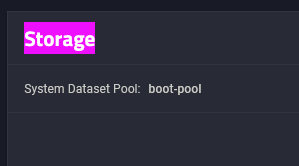After updating to the latest version I am now having an issue where my boot pool is randomly getting filled up.
Nothing changed on my end from the previous release.
After updating to the latest version I am now having an issue where my boot pool is randomly getting filled up.
Nothing changed on my end from the previous release.
Where is your system dataset?
Try looking at this thread
In the end, that user did a config backup, overwrite install on boot device but you may find the issue by looking at disk usages in the CLI.
nvm found it

Ideally we woudln’t need to do that but if that’s the only solution I will ![]()
You can still find out what is causing your boot-pool to fill up.
The du command-line tool is a good place to start.
Here’s an example that works in bash:
for dir in `ls -1 / | grep -v mnt` ; do du -hsx /$dir; done | sort -hr
You might need to run it with admin/root privileges, so that it can access and traverse all directories.
You can use sudo -i in SCALE to change into the root user. ( I think? I’m not sure what restrictions were put in place.)
It seems that for some reason it was writing apps to /mnt.
Now to find the random files it created ![]()
df -h | grep boot-pool
boot-pool/ROOT/24.10.2 26G 166M 26G 1% /
boot-pool/ROOT/24.10.2/audit 26G 6.0M 26G 1% /audit
boot-pool/ROOT/24.10.2/conf 26G 6.9M 26G 1% /conf
boot-pool/ROOT/24.10.2/data 26G 384K 26G 1% /data
boot-pool/ROOT/24.10.2/etc 26G 6.9M 26G 1% /etc
boot-pool/ROOT/24.10.2/home 26G 256K 26G 1% /home
boot-pool/ROOT/24.10.2/mnt 181G 156G 26G 86% /mnt
boot-pool/ROOT/24.10.2/opt 26G 128K 26G 1% /opt
boot-pool/ROOT/24.10.2/root 28G 1.7G 26G 6% /root
boot-pool/ROOT/24.10.2/var 26G 132M 26G 1% /var
boot-pool/ROOT/24.10.2/var/ca-certificates 26G 128K 26G 1% /var/local/ca-certificates
boot-pool/ROOT/24.10.2/var/log 27G 551M 26G 3% /var/log
boot-pool/ROOT/24.10.2/var/log/journal 26G 11M 26G 1% /var/log/journal
boot-pool/grub 26G 8.3M 26G 1% /boot/grub
boot-pool/.system 28G 1.6G 26G 6% /var/db/system
boot-pool/.system/cores 1.0G 128K 1.0G 1% /var/db/system/cores
boot-pool/.system/nfs 26G 256K 26G 1% /var/db/system/nfs
boot-pool/.system/samba4 26G 1.3M 26G 1% /var/db/system/samba4
boot-pool/.system/configs-535a85bf35cc472d88ee664a1c80b367 26G 151M 26G 1% /var/db/system/configs-535a85bf35cc472d88ee664a1c80b367
boot-pool/.system/netdata-535a85bf35cc472d88ee664a1c80b367 27G 1.1G 26G 5% /var/db/system/netdata
You can try booting into the previous boot environment and see if the apps location was changed.between those two. It is odd as it looks like you have been on 24.10.x series for a while, going by your screenshot.
This is a bit tricky.
The issue can occur if the ix-apps dataset fails to mount, and some of the apps system races it.
I’ve solved this by:
umount /mnt/.ix-apps)rm -rf /mnt/.ix-apps (this is destructive, but the actual dataset should not be mounted)You’ll also have to delete the offending Boot Environment that is consuming 126 GiB.
Think it’d be better to boot to the previous install, unmount apps and delete the dataset then reinstall the update?
UPDATE: Rebooted into previous version and made sure all apps were functioning correctly. Then I deleted the new version and installed it again, everything went smooth this time ![]()
I have the same problem…
What is going on here? i cant remove mnt/.ix-apps because it has important data.
You have at least one application misconfiguration and its storing its data on the boot pool / in the apps location.
You’re not supposed to. Reboot to the previous install and do as I said. Set the previous install as the active/primary and then delete the new version once you verify that your apps work ![]()
Probably not. In my case I had changed literally nothing and after updating it had not mounted the apps pool properly. Please don’t assume otherwise ![]()
I found the issue. It indeed was a misconfigured container. I just need to figure out why it saved data (backup data) into my /root/docker/ path.
All this TrueNas Host-Path thing and different mount paths giving me a headache >.<
Hey guys in this topic, I have the same prob lem and now I cant boot into the system to show the control pannel. Only have a bash to operate. What can I do now to solve it? T^T
See Boot-Pool 100% Usage? - #6 by winnielinnie
That should at least let you find what filled up